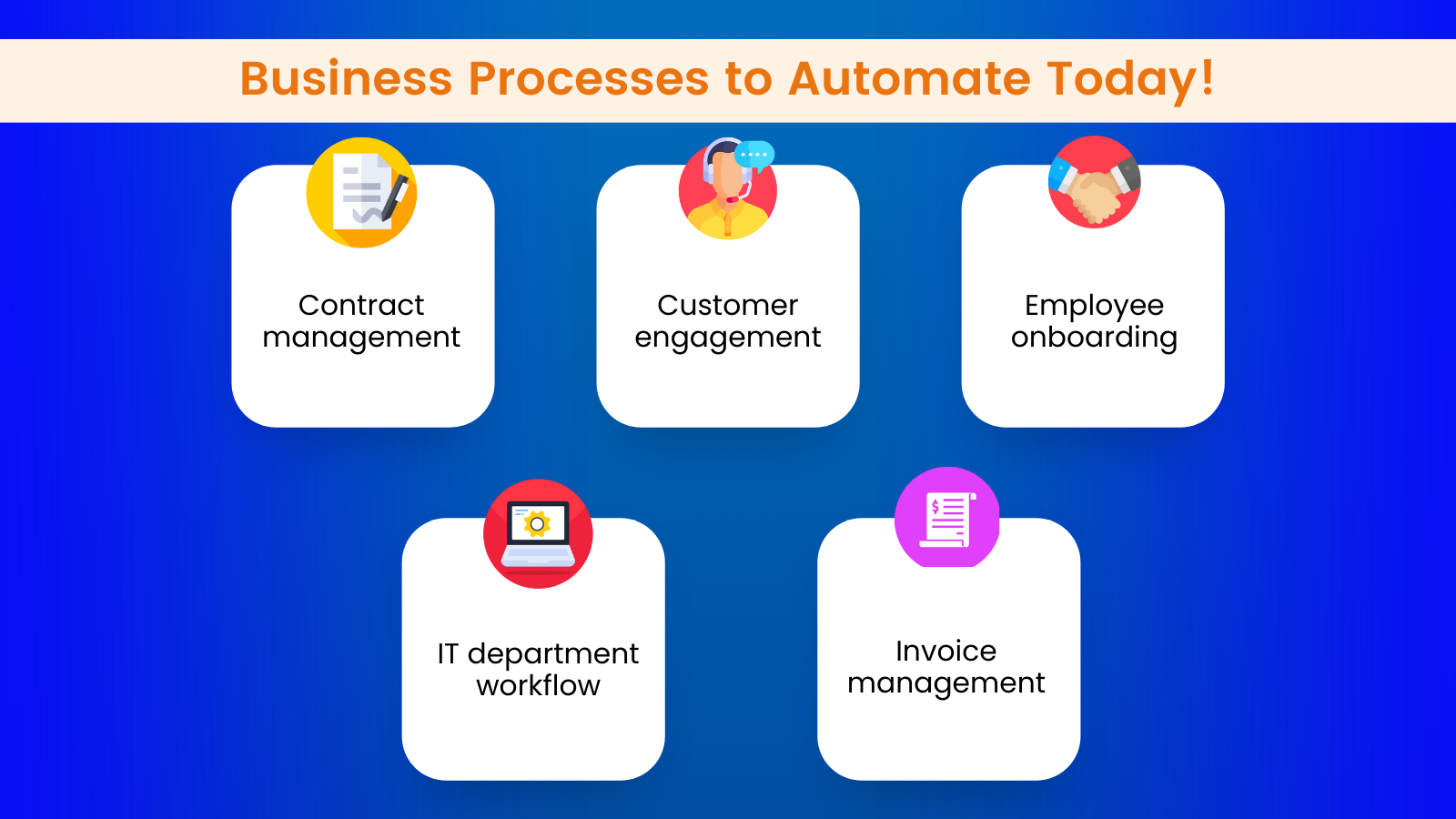
One of the crucial things aspects of the pandemic was teaching us that anything can change, and we need to be geared up when that change comes. It transformed the way that companies worked globally. People were no longer required to work in an office, and remote work became all the hype. And with this change, we came across a lot of chaos.
Now in the post-pandemic world, with offices opening up and hybrid work environments setting in, automating processes is a great way to establish order and ensure your organization operates optimally. Automating business processes is a great way to streamline processes and ensure that every task gets noticed and inefficiencies in the system are addressed.
So it is no surprise that digital transformation has taken the business world by storm. A lot of companies have been automating business processes and continually innovating. Read on to find the key processes that companies are automating now! Also, learn how & why automating processes can help you as well.
Why automate business processes?
Business process automation is essential for companies looking to increase efficiency, save time and resources, and stay ahead of the competition in today’s digital world. By automating tasks such as data entry, inventory management, and payroll processing, businesses can free up valuable time for higher-value activities.

Automation can also be applied to functions such as marketing, customer support, and supply chain management, improving overall performance and increasing profits and customer satisfaction. In summary, automation is an excellent tool for businesses to thrive in the digital age.
Also Read: How Process Automation Accelerates Digital Transformation
Marketing & sales department for Contract management
Managing contracts is a key element of sales as well as business relationships. This aspect of the business often gets complicated due to mismanagement resulting in non-compliance, errors in communication and false information, and it can even cost you a really good deal! Fortunately, there is a way around this! Automating contract management gives you the ability to streamline the process from start to end and ensure that compliance is maintained. It also removes any unnecessary delays and confusion.
Apart from this, having accurate, updated data will also ensure all your teams are working in sync, thus speeding up contact creation, review and approval.
Customer engagement
With the way the world is moving, customers expect personalized service and tailored experiences. Automating processes at work is a great way to ensure that you meet your customers’ expectations and delight them in the process!
Time & ease of use are of the essence. Your customers should be able to contact you as and when they please, and they expect a prompt response. A few minutes wait or a couple of missed calls, and you risk losing a customer.
By automating this process, you can tailor the forms your customers see, ask them only the necessary information and store it for future reference. This repertoire will further allow you to analyze, draw valuable insights and improve, and it will be extremely easy to use for your employees as well!
IT department workflow
Use automation to create a highly responsive help desk. Are you tired of waiting and having to remind your IT team of a problem you’re facing, not to mention the lost tickets? It happens – but it doesn’t have to anymore!
Creating digital workflows and automating processes will ensure that your IT team gets the information and is equipped to respond appropriately and on time. It ensures that the documents are easy to find and transparency is maintained while resolving the issue.
This will let you solve IT problems faster with improved accuracy, let your team handle them from anywhere, and improve the overall satisfaction.

HR department for Employee onboarding
Your HR team is already hard at work finding the perfect talent for your company, and it would not be beneficial for organization to lose these handpicked people because of an inefficient and frustrating onboarding process.
This is where automating processes can help your human resource team. Repetitive tasks can be automated so that your hires get the appropriate forms and information at the right time. It will also help you collect relevant data and ensure approvals and other vital tasks like assigning equipment, security protocols, account creation, and software licenses are seamlessly done.
Automation can cut down on costs and time here and give your new hires the perfect introduction to your organization to get them started. Satisfying them with an efficient onboarding process will further align them to your company’s goals and indirectly help with employee retention.
Also Read: Top 10 Business Process Management Tools for Your Business
Finance department for Invoice management
Despite all the innovation in the industry now, invoice management still remains one of the key processes that have a lot of paper trails and inefficiencies. Manually processing invoices is simply not the way to go! Apart from unnecessarily taking up your employees’ time, it also creates frustration and errors both within your organization and with your external vendors.
Automation is hugely beneficial here because you can automatically collect relevant information and route the invoice for reviews and approvals without manual intervention. It ensures that payments are made on time, preventing any missed invoices or due dates. It also offers transparency in addition to accuracy. You can always know who is approving what and why, and that is the key to making it really, really easy on you during the audit season.

Conclusion: Automating business processes boosts efficiency
Automation is here to stay! Whether you have automated 50% of the processes mentioned here or you are just considering automating processes, improvement is always possible, and there is no time like the present to initiate your digital transformation efforts. Before you know it, you will be well on your way to making your organization as efficient as possible – getting the best use of your employees’ time and energy!
Frequently Asked Questions
Here we have answered some frequently asked questions to learn more about the benefits and applications of this essential tool for modern businesses.
Q. What are business process automation best practices?
Best practices for BPA include:
1. Identifying the right processes
2. Setting clear goals
3. Involving stakeholders
4. Evaluating existing systems
5. Testing before implementation
6. Monitoring and optimizing
7. Training employees
Following these practices can help companies successfully implement BPA and realize its benefits.
Q. What are some HR processes that can be automated?
Here are some HR processes that can be automated:
1. Recruitment: Automation can help with resume screening, scheduling interviews, and sending follow-up emails.
2. Onboarding: Automation can facilitate new hire paperwork, training, and communication with various departments.
3. Time and attendance: Automation can track employee hours, calculate overtime, and manage time off requests.
4. Payroll: Automation can handle payroll processing, tax withholding, and direct deposit.
5. Employee offboarding: Automation can assist with the process of removing system access, collecting company property, and conducting exit interviews.
Q. Why automating processes can help businesses?
Automating a process can help businesses stay competitive in an increasingly fast-paced and digital business environment. By embracing automation, businesses can keep up with the latest technology trends and stay ahead of the curve.
Q. List out some of the business process automation use cases?
Here are some examples of business processes that can be automated:
Human Resources: Automating the recruitment process, employee onboarding, and performance evaluations.
Finance and Accounting: Automating invoice processing, expense reporting, and financial analysis.
Customer Service: Automating customer inquiries, issue resolution, and feedback management.
Manufacturing: Automating production scheduling, inventory management, and quality control.
Marketing: Automating email marketing, social media management, and lead generation.
How can automation enhance operational efficiency?
Automation reduces manual errors, speeds up tasks, and frees up resources for strategic activities, improving overall efficiency.
What are the advantages of combining BPM with automation?
Combining BPM with automation streamlines processes ensures consistency, allows for better monitoring, and enables continuous improvement.
Login
Please login to comment
0 Comments
Oldest
















